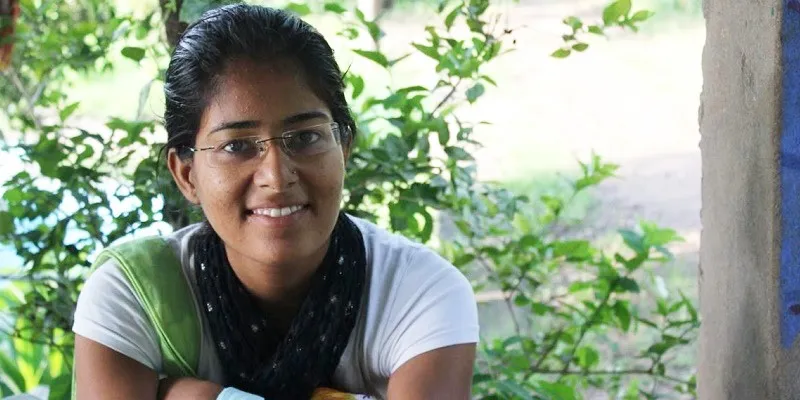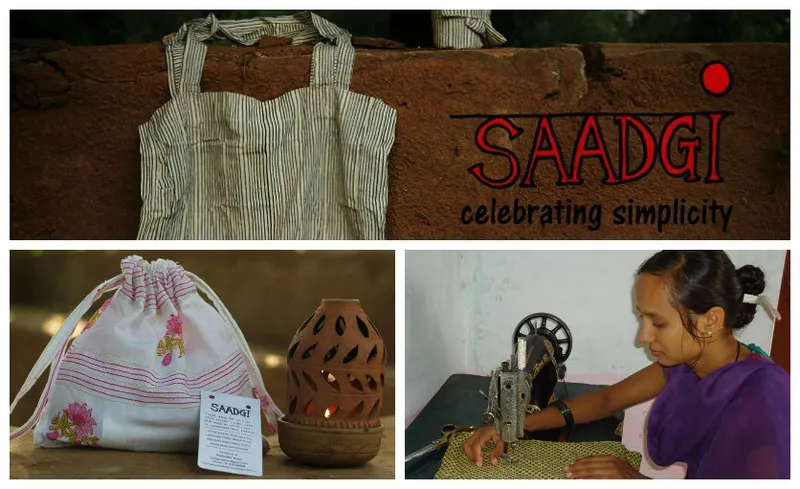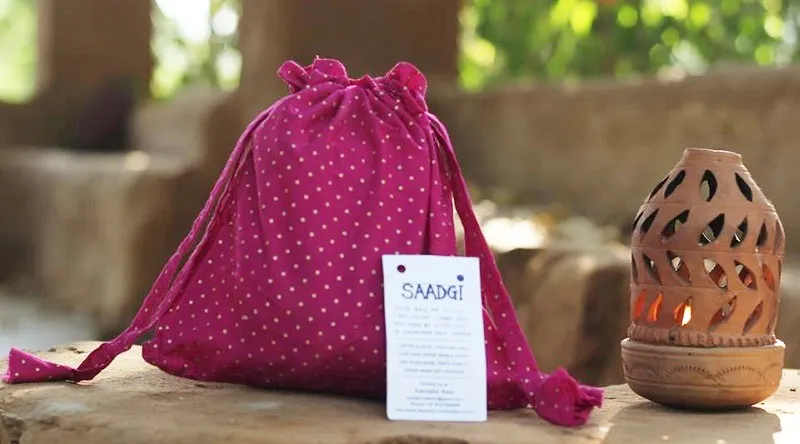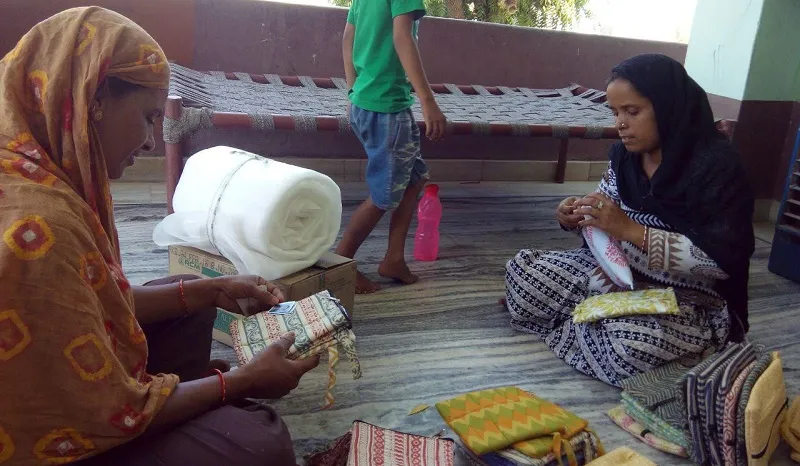How Saadgi’s upcycled bags are a small step in fighting consumerism
‘Saadgi’ means simplicity, an ethos of back-to-basics. Kamalbir Kaur’s Saadgi Creations, located on the outskirts of Udaipur, is imbued with the spirit of simple living. 25-year-old Kamalbir’s initiative offers environmentally-conscious buyers a range of bags and accessories upcycled from the fabric waste from textile factories. Started in early January, 2014, Saadgi’s genesis can be traced to Swaraj University, the two-year youth learning programme in Udaipur that Kamalbir was a part of. The focus of the programme was on green entrepreneurship, including an exploration of basic business skills within the context of ecological sustainability and social justice.

“During the two-year programme at Swaraj University, there were sessions called ‘Rethinking Development’ where we debated the downside of development and consumerism, and their long-term impact. Saadgi germinated from a thought of rethinking our approach to waste as well as reducing it. Historically, Indian households have been frugal and people believed in avoiding wastage and using up every little thing as much as possible. This mindset is changing in the younger generations. Hence I wanted to start something where waste was the raw material,” explains Kamalbir.
Why is consumerism a big issue?
According to National Geographic, Americans and Western Europeans have had a lock on unsustainable over-consumption for decades. But now developing countries are catching up rapidly, to the detriment of the environment, health, and happiness. Approximately 1.7 billion people worldwide now belong to the ‘consumer class’ — the group of people characterised by diets of highly processed food, desire for bigger houses, more and bigger cars, higher levels of debt, and lifestyles devoted to the accumulation of non-essential goods. The ill-effects of this lifestyle are taking a toll on people’s physical health and emotional well-being and, most importantly, are extremely detrimental to the environment.
Kabaad se jugaad
Kamalbir’s brother Jodhbir was her pillar of support during the early days of building Saadgi. When she thought of turning the pouches she used to make and sell among her acquaintances into an enterprise, Kamalbir started looking to put a team together. She happened to meet a few women at the village called Nayakheda where Swaraj University is situated. Two women joined her initiative at first and the team has grown to seven women now.

Kamalbir designs the products but also encourages her team to brainstorm since she wants to encourage their creativity. In the early days, the team made pencil pouches only. Kamalbir was also finding her feet in establishing the team, designing, and costing. Being from an agricultural family, business was totally new to her. Slowly, the concept of Saadgi evolved into making different utility products out of fabric waste which can be tailors’ waste and factory fabric waste as these are bits and pieces of brand new material that are just thrown away.

When conservation gets commercial!
Kamalbir is often assailed by her conscience since she wonders if she is creating more waste by procuring waste as raw material at Saadgi because it encourages factories to generate that waste as they know their waste can be used! “This is a question that is difficult to answer, not just for Saadgi, but also for other players in the recycling/upcycling space,” says Kamalbir.

Upcycling and recycling with the intention of reducing waste and improving sustainability was almost unheard of in India a decade ago. Now there are many organisations working towards making a difference in this space. Upcycling boutique BlueMadeGreen reuses fabrics and materials and uses minimum new resources to make their products. Amishi Shah’s the Upcycle Project creates beautiful objects out of recycled pieces of glass, plastic, and other materials detrimental for the environment if not reused. Kabadiwalla Connect works with designers to explore different ways in which waste can be upcycled with the intention of reducing the waste going into landfills and protecting the environment. RootBazaar was founded on the principle of living a zero-waste lifestyle. The founders Sabira Lakhani and Sahar Mansoor realised that in today’s society, consumption will not stop. So they believe if we are going to mass consume, it should be done less impactfully. Living a zero-waste lifestyle is not easy, but it’s not impossible either. Their products are packaged in zero-waste packaging, using upcycled glass bottles with compostable coconut fibre twig for tags. These organisations and many others are working towards making a difference.
As of now, Kamalbir and her team do not intend to scale up, since that would set in motion a cycle of production and consumption that would ultimately lead to the women in her team not having any time to devote to their families, livestock, and farms.

"My vision is to live a simple life where money should hardly be used. I want to learn life skills like cooking, farming, carpentry, plumbing, and waste management so that I can become self-sufficient and live on a modest income instead of getting drawn into the cycle of consumerism."
Brand Saadgi
Saadgi products sell through retail outlets like Eco Hut and Jailaxmi Handicraft in Udaipur and Pagdandi in Pune. Saadgi has also exhibited its products at Shilpgram Handicraft Mela in Udaipur and recently concluded a month-long exhibition at Green the Map store, Delhi. They also take orders from customers directly. In two-and-a-half years, revenue generated by the team is Rs. 2.5 lakh from around 3,500 products sold.
Victoria Moran’s lines from Lit from Within: Tending Your Soul for Lifelong Beauty best describe Kamalbir’s philosophy: “A simple life is not seeing how little we can get by with — that’s poverty — but how efficiently we can put first things first…. When you’re clear about your purpose and your priorities, you can painlessly discard whatever does not support these, whether it’s clutter in your cabinets or commitments on your calendar.”







